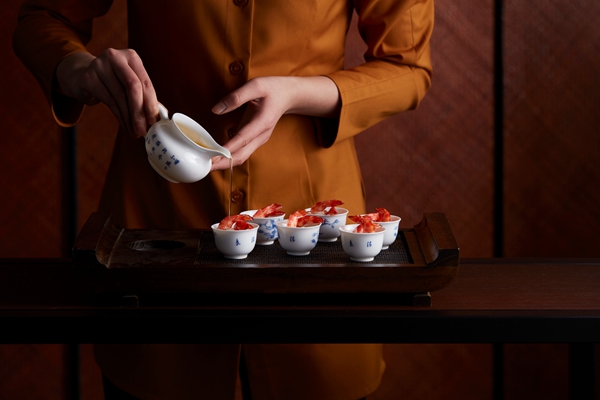Leaving it all on the table
By Li Yingxue | China Daily | Updated: 2020-07-21 07:45

Jurinka likes to visit Maliandao in Xicheng district, Beijing's best-known marketplace for tea. He used to travel to Shanghai right after the spring tea harvest to sample the fresh Longjing tea. He plans to experiment more with tea-infused beers.
Like Jurinka, Antonio de Luca, head bartender of Tian Bar in Guangzhou, Guangdong province, likes to try different combinations of tea and liquor to create new cocktails.
One of his concoctions, named Passion, combines a soda made with jasmine tea and apple cider vinegar mixed with raspberry and sugar. It packs a complex punch on the palate with its blend of sweet, sour and aromatic flavors.
Arriving in Beijing in 2018, de Luca started to drink Chinese tea, and Pu'er tea has become his favorite. He says Pu'er and whisky is a good combination for cocktails as they both have strong flavors.
"Actually tea is one of the first ingredients I always try to use when I'm creating new cocktails," he says, adding that when using tea, 85 percent of the time, it's better with gin or vodka.
Yuanchanghou Teahouse, which boasts a history of more than a century, opened Yuanshe Tea Bar in Beijing last year. The time-honored brand is hoping to attract a younger clientele with a menu of creative tea-flavored cocktails.
According to Ruan Guangfeng from China Food Information Center, the benefits of tea come from its antioxidants, such as tea polyphenols, as well as boost provided by the caffeine. Additionally, it's a good method of consuming water and staying hydrated.
He cites research published by World Cancer Research Fund International in 2015, which finds that there is some evidence to suggest that "drinking tea may lower the risk of bladder cancer".
In the book Food & Health, Evidence Based Review published in 2016 by the Chinese Nutrition Society, it says "drinking tea may lower the risk of strokes, Type 2 diabetes, cardiovascular disease, ovarian cancer and stomach cancer".
Ruan says key to healthy tea drinking is to avoid extra sugar and fat, and make sure the tea meets the trace standard of agricultural pesticide use.
























